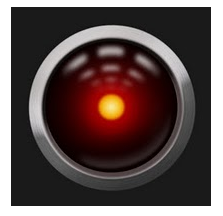NYT: Speedy New Traders Makes Waves Far from Wall Street
 Courtesy of Trader Mark at Fund My Mutual Fund
Courtesy of Trader Mark at Fund My Mutual Fund
It is interesting to read the take on the brotherhood of HAL9000 in the more mainstream press – I do find it bemusing that the headline in this New York Times article uses the word "new traders" as if they just surfaced last month or 12 months ago. Hello dear writers – these firms now control 2/3rds of all trades… there is nothing new here. Still an interesting story because as with the story of Getco [Aug 28, 2009: WSJ – Meet Getco, High Frequency Trade King] it puts a human face to the silicon chips and programming code. Despite claims of "providing liquidity" and hence being a benign force for the galaxy (in fact universe) we see clearly in 2007, 2008 and two weeks ago when things go haywire their "liquidity" goes bye bye. I almost imagine frantic humans rushing to computer to unplug them around 2:53 PM that Thursday. Ctrl-alt-delete! Actually it was ‘HF STOP’!!!
Via NYT:
- Above the Restoration Hardware in this Jersey Shore town, not far from the Navesink River, lurks a Wall Street giant. Here, inside the humdrum offices of a tiny trading firm called Tradeworx, workers in their 20s and 30s in jeans and T-shirts quietly tend high-speed computers that typically buy and sell 80 million shares a day.
- But on the afternoon of May 6, as the stock market began to plunge in the “flash crash,” someone here walked up to one of those computers and typed the command HF STOP: sell everything, and shutdown.
- Across the country, several of Tradeworx’s counterparts did the same. ("we’re here to provide liquidity, as long as the market is going in the right direction i.e our direction") In a blink, some of the most powerful players in the stock market today — high-frequency traders — went dark. The result sent chills through the financial world.
- These are short-term bets. Very short. The founder of Tradebot, in Kansas City, Mo., told students in 2008 that his firm typically held stocks for 11 seconds. Tradebot, one of the biggest high-frequency traders around, had not had a losing day in four years, he said.
- The Tradeworx computers get price quotes from the exchanges, decide how to trade, complete a risk analysis and generate a buy or sell order — in 20 microseconds. The computers trade in and out of individual stocks, indexes and ETFs, all day long. Mr. Narang, for the most part, has no idea which stocks Tradeworx is buying or selling.
- Most of these firms typically hold onto stocks for a few seconds, minutes or hours and usually end the day with little or no position in the market. Their profits come in slivers of a penny, but they can reap those incremental rewards over and over, all day long.
- Unlike old-fashioned specialists on the NYSE, who are obligated to stay in the market whether it is rising or falling, high-frequency traders can walk away at any time. (shhh!! stick to the script – liquidity provider!)
- While market regulators are still trying to figure out what happened on May 6, the decision of high-frequency traders to withdraw from the marketplace is under examination. Did their decision create a market vacuum that caused prices to plunge even faster? (uhh, not according to CNBC… there was 1 rogue trader who apparently has a special keyboard that has the letter B on it next to M… and somehow that person can make trades in the billions by pressing B… yeh, that’s the story we’ll tell the sheeple)
- “Whenever you have a lot of money, a lot of change, little or no transparency, and therefore, no regulation, you have the potential for a market disaster,” Senator Kaufman added. “That’s what we have in high frequency trading.” (no Mr Kaufman, it is financial innovation, don’t argue)
- Critics say the markets have become unfair to investors who cannot invest millions in high-tech computers. The exchanges offer incentives, including rebates, which can add up to meaningful profits for high-volume traders as well.
- “The market structure has morphed from one that was equitable and fair to one where those who get the greatest perks, who have the speed, have all of the advantages,” said Sal Arnuk, who runs an equity trading firm in New Jersey. (sour grapes – get yourself a Commodore 64 and get into the game! Everyone is doing it and having computers bet on moves for the next 6.7 seconds is what Wall Street was created for – Wall Street just didn’t realize it 100+ years ago. The benefits to society are endless – join us)
Oh and my favorite line from every HFT story the past 2+ years… right there towards the end of the NYT story.
- High-frequency traders insist that they provide the market with liquidity, thus enabling investors to trade easily.
Ahhhhhh the sweet smell of talking points repeated for years on end!
It’s actually all quite interesting…whereas [profit making] market makers (who were obliged to stick around) were a supporting actor in the market for eons, now the new era market maker is the dominant force, not the supporting force. Therefore the rest of us are now the bit actors – the irony is great. And when things turn rough, he/she/it will hit HF-STOP and you have Accenture at 1 cent as all bids are sucked out of the market. Sounds like a great innovation – if we can only eliminate any of those who hold stocks for more than 18 seconds from the market completely it should really be nirvana.
*****
See also: Once More For Emphasis: SOMEONE INVENTED A MONEY MACHINE


